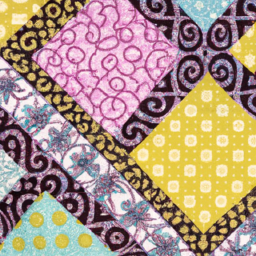
Quilt Patterns On Barns: Uncovering the Meaning

Driving through rural landscapes, it’s becoming increasingly common to notice beautifully painted quilt patterns adorning the sides of barns. Beyond their aesthetic appeal, these quilt patterns on barns carry a deeper significance that intertwines tradition, community, and cultural heritage.
The Origins of Barn Quilt Patterns
Barn quilt patterns trace their roots back to early American settlers. These settlers, often of German and Scandinavian descent, brought with them the quilting tradition. Quilts were not only utilitarian items but also creative expressions and sources of community bonding.
However, the idea of painting quilt patterns directly onto barns emerged as a tribute to the craft in the late 20th century. Donna Sue Groves, a native of Ohio, is credited with starting the barn quilt movement. Inspired by her mother’s quilting, she painted a quilt square on her own barn, sparking a phenomenon that quickly spread throughout the United States and beyond.’
Symbolism and Community Spirit
Each barn quilt pattern holds its own unique symbolism. Many barn owners choose patterns with personal meanings or ones that reflect their heritage. Others opt for designs that represent a particular historical event, such as the Ohio Star pattern honoring the state’s rich history or the Tree of Life pattern representing growth and strength.
These vibrant patterns foster a sense of community pride. By featuring quilt patterns on their barns, owners partake in a collective act of preserving history, showcasing their creative spirit, and promoting regional identity. Barn quilt trails have even been established in various areas, allowing visitors to explore picturesque rural landscapes while discovering the stories behind each unique pattern.
The Role of Quilt Patterns in Modern Culture
The presence of quilt patterns on barns goes beyond the realm of aesthetics. It revitalizes traditional crafts, encouraging younger generations to appreciate and learn more about quilting techniques. It also serves as a visual narrative, helping to preserve cultural heritage in areas where quilting traditions may have started to fade.
The barn quilt movement has grown into a cultural phenomenon, with communities hosting festivals, workshops, and competitions centered around quilt patterns. Artists and enthusiasts alike find inspiration in the intricate designs, incorporating them into various art forms and applications, from textiles to interior decor.
Conclusion
Quilt patterns on barns are not mere paintings; they are emblematic of a rich heritage, a celebration of community, and a testament to the enduring power of creativity. As you drive along country roads, take a moment to appreciate and unravel the meanings behind these vibrant patterns that grace barns, connecting us with the past while adding color and charm to our present.
Image source: barn_quilt_pattern.jpg
Interesting artwork! This is a beautiful and creative way to represent the history of a certain area. It’s intriguing to consider what type of quilt patterns were chosen and why certain symbols were selected for each barn.
Wow, this is so cool! Quilts are such incredible expressions of a culture’s history and traditions, and it’s so neat to see these stories translated into artwork on the sides of these old barns.
This is such an inspiring concept, and the quilts on the side of each barn are truly unique. I’m sure some of them have historical meaning for the people living in the area, and it’s fascinating to learn about the stories behind each one.
This is such an inspiring way to infuse art and culture into an unexpected part of nature. The creativity behind this concept is astounding and it’s a unique way to learn about the traditions and stories behind each quilt pattern and barn.